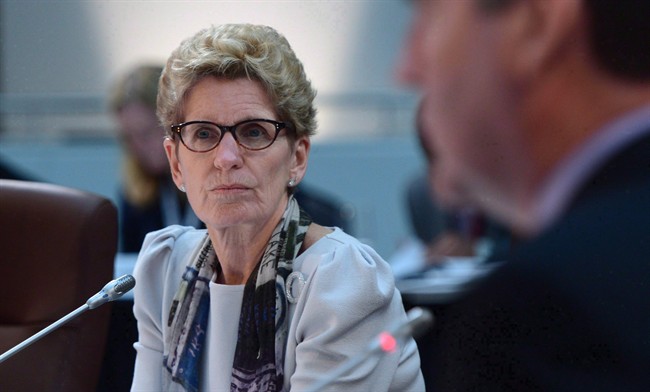Happy New Year? Not for Tim Hortons. The iconic coffee chain has been roasted recently for decisions by some of its franchise operators (including the children of its founders) to cancel paid coffee breaks and oblige employees to fund 50 to 75 per cent of the costs of their benefits.

“These changes are due to the increase of wages to $14.00 minimum wage on January 1, 2018, then $15.00 per hour on January 1, 2019, as well as the lack of assistance and financial help from our Head Office and from the Government,” reads a company memo employees were asked to sign.
WATCH BELOW: The Breakdown: Kathleen Wynne calls Tim Hortons heir a ‘bully’

At first blush, they do seem mean — right up there with the Canada Revenue Agency proposing last year that employees declare their discount donuts as taxable benefits. Paid coffee breaks or tax-free snacks aren’t a human right, but they’re the little things that help humanize the workplace — especially in low-paid jobs that aren’t particularly fun on their own. Mess with that and you’ll get a backlash — as both Tim’s and the federal government quickly found out.
But instead of cracking down on restaurant owners, Tim Hortons should be screaming at Ontario Premier Kathleen Wynne. With an election less than a year away, Wynne introduced Bill 148, the so-called “Fair Workplaces, Better Jobs Act” — a sweeping set of labour reforms that includes the hike in the province’s hourly minimum wage from $11.40 to $14 on Jan. 1, 2018, and to $15 on Jan. 1, 2019.
The bill is one of several government measures — including rent control and pharmacare for under-25’s — designed to appeal to ‘progressive,’ lower-income voters. It appears to be working: some polls show a tightening race between the Liberals and the Progressive Conservatives over the past six months. Six in ten voters support the minimum wage increase, particularly younger voters, women and those who voted Liberal or NDP in the last provincial election.
That may be because they aren’t aware of the possible unintended consequences of a wage hike: higher unemployment, particularly among the very low-income workers the measure purportedly will benefit. Estimates of potential job losses vary from 90,000 (TD Bank) to 185,000 (Keep Ontario Working Coalition).
- Roll Up To Win? Tim Hortons says $55K boat win email was ‘human error’
- Ontario premier calls cost of gas ‘absolutely disgusting,’ raises price-gouging concerns
- Bird flu risk to humans an ‘enormous concern,’ WHO says. Here’s what to know
- Election interference worse than government admits, rights coalition says
That’s because no business can absorb a 32-per-cent hike in wages over 18 months without changing the way it operates. Tim Hortons chose to cut breaks and increase employee contributions, but for other labour-intensive operations there are many other options on the table — none of them good news for workers. They include hiring fewer new employees and working current staff harder, firing the least productive employees and hiring more productive replacements, increasing automation and shedding workers entirely, or disinvesting in Ontario by locating operations elsewhere.
Some businesses, like restaurants and grocery chains, don’t have the latter option, but one sector does: manufacturing. This sector already has been slammed by the provincial government’s energy policies in the form of skyrocketing electricity rates. According to a study published last year by the Fraser Institute, between 2010 and 2016, electricity costs for small industrial consumers increased by 50 per cent in Ottawa and 48 per cent in Toronto, compared to 15 per cent in the rest of the country, leading to a loss of 75,000 jobs. Coupled with the other elements of bill 148 — part time workers receiving the same pay as full-time workers, the ability to set their schedules after three months of work, card-based union certification — the minimum wage hike will likely encourage other businesses to seek savings or pull up stakes entirely.
The Tim’s decision is thus just the tip of the ice-cap. Will these decisions stain the reputations of the companies that make them? Or rebound on the Liberals before the June vote? Wynne likely is betting that workers with more cash in their pockets will outweigh those on the unemployment line — at least long enough to get her another term in office. Make that a double-double with extra cynicism, please.
Tasha Kheiriddin can be heard between noon and 2 p.m. ET on Global News Radio 640 Toronto. She’s also a columnist with Global News and iPolitics.ca, where this piece first appeared.




Comments